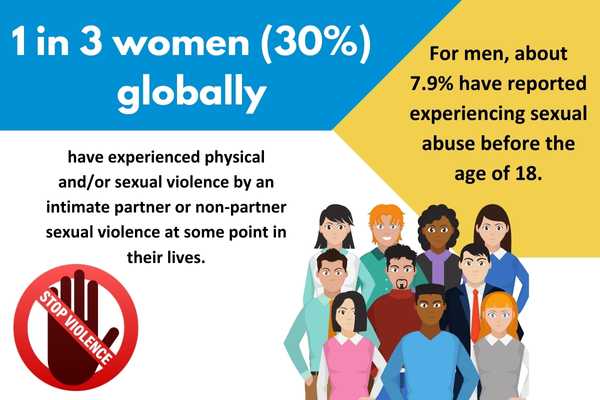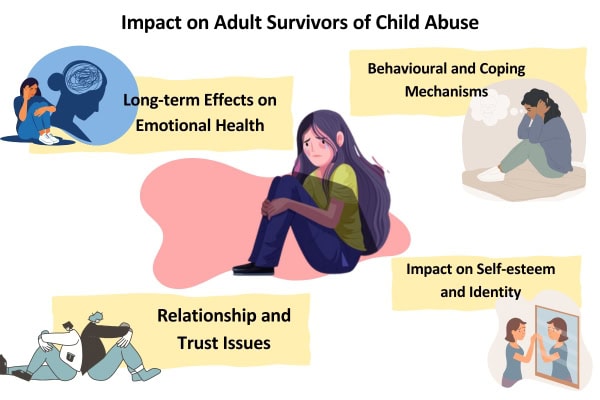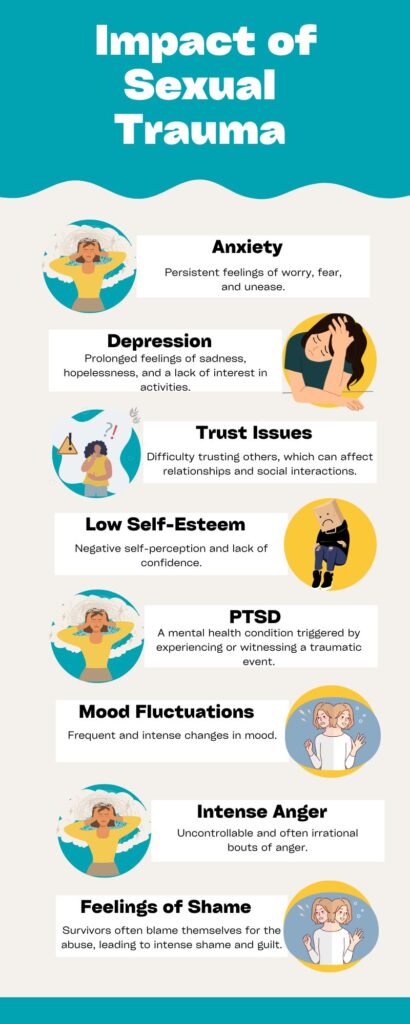Sexual Trauma Counselling Singapore
Home > Counselling Services > Sexual Trauma Counselling
Content Warning
Please be advised that the following article discusses sexual trauma-related topic which may be triggering for some readers. If you or someone you know is experiencing abuse, contact Sexual Assault Care Centre at +65 6779 0282 for immediate support or email them at [email protected]. They usually revert within 3 working days.

Providing Care and Healing After Sexual Trauma
Sexual abuse is a pervasive issue affecting millions globally. Studies show that a significant proportion of women and men have experienced some form of sexual violence. These alarming statistics emphasize the urgent need for comprehensive support and resources for survivors.
At Insightful Counselling, we recognize the profound impact that sexual abuse/trauma can have on your mental and emotional well-being. Feelings of anxiety, depression, and overwhelming distress are common among survivors, and it can be difficult to find the right path forward.
Our goal is to provide you with the understanding and support you need to navigate your healing journey. We firmly believe that every individual has the right to live free from all forms of sexual violence and abuse.
Our services are available to female, male, LGBTQ survivors of any age. We provide support to those with both historical and recent experiences of sexual violence, as well as to the friends and family members who support survivors.
We offer a safe and compassionate environment where you can explore the available resources and learn what to expect during the recovery process.
Always remember, the abuse and trauma you experienced is not your fault. With the right support and therapy, you can rebuild your life.
Make an appointment today to begin your journey towards healing and reclaiming your life.

According to the World Health Organization, around 1 in 3 women (30%) globally have experienced physical and/or sexual violence by an intimate partner or non-partner sexual violence at some point in their lives. For men, about 7.9% have reported experiencing sexual abuse before the age of 18. These statistics highlight the widespread prevalence of sexual abuse worldwide.
Sexual abuse often begins in childhood or young adulthood. Many survivors experience their first incident of sexual violence before turning 25. This early onset underscores the vulnerability of young individuals to such traumatic experiences.
In approximately 80% of cases, survivors know their abusers. Sexual abuse is commonly perpetrated by someone within the survivor’s close circle, such as romantic partners, family members, or neighbours. When the abuser is a familiar figure, it can increase the survivor’s anxiety about reporting the abuse, fearing repercussions within their community or family.
If you or someone you know has experienced sexual abuse, reach out for help today. Contact Insightful Counselling to begin your path to healing.
Sexual abuse involves any non-consensual sexual activity, including forced intercourse, molestation, and inappropriate touching. It can happen to anyone, regardless of age, gender, or background, and often leads to long-term emotional and psychological trauma.
Make an appointment today to start your healing journey with Insightful Counselling. Our experienced therapists are here to support you every step of the way.

The impact of childhood sexual abuse can persist long into adulthood, affecting various aspects of a survivor’s life. Adult survivors of child sexual abuse often face complex emotional, psychological, and relational challenges.
Long-term Effects on Emotional Health
Survivors frequently struggle with managing emotions, leading to issues like anxiety, depression, and emotional numbness. For instance, survivors may find it challenging to express their feelings, often suppressing emotions due to past trauma.
Relationship and Trust Issues
Many adult survivors experience difficulties in trusting others and forming healthy relationships. They may oscillate between a deep yearning for intimacy and a fear of being hurt again. This dynamic can strain relationships with partners, friends, and family.
Impact on Self-esteem and Identity
Survivors often grapple with low self-esteem and a distorted self-image. The trauma can leave them feeling worthless or perpetually flawed, influencing their personal and professional lives.
Behavioural and Coping Mechanisms
Some survivors develop maladaptive coping mechanisms such as substance abuse or self-harm to manage their pain. Others might exhibit controlling behaviors as a way to maintain a sense of safety and control in their lives.
Call to Action
Take the first step towards healing by reaching out for support. WhatsApp Insightful Counselling to schedule an appointment and begin your journey to recovery.
Sexual trauma can profoundly affect a person’s mental health, leading to conditions such as anxiety, depression, and other psychological issues. These effects can be long-lasting, impacting survivors whether the traumatic event occurred recently or many years ago. Here are some common mental health impacts of sexual trauma:
Anxiety: Persistent feelings of worry, fear, and unease.
Example: Maria often experiences panic attacks and constant anxiety after her traumatic experience.

Depression: Prolonged feelings of sadness, hopelessness, and a lack of interest in activities.
Example: John struggles to find joy in life and often feels overwhelmed by sadness, making it difficult to carry out daily tasks.
Trust Issues: Difficulty trusting others, which can affect relationships and social interactions.
Example: Sarah finds it hard to trust even her close friends and family, fearing betrayal and further hurt.
Low Self-Esteem: Negative self-perception and lack of confidence.
Example: Emma feels unworthy and doubts her abilities, which affects her performance at work and in social situations.
Feelings and Thoughts of Shame and Guilt: Survivors often blame themselves for the abuse, leading to intense shame and guilt.
Example: Alex constantly feels ashamed and guilty, mistakenly believing the abuse was his fault.
Post-Traumatic Stress Disorder (PTSD): A mental health condition triggered by experiencing or witnessing a traumatic event,
characterized by flashbacks, nightmares, and severe anxiety.
Example: David suffers from PTSD, experiencing vivid flashbacks and nightmares related to his trauma.
Mood Fluctuations: Frequent and intense changes in mood.
Example: Rebecca experiences severe mood swings, from intense anger to deep sadness, often without warning.
Periods of Intense Anger: Uncontrollable and often irrational bouts of anger.
Example: Michael finds himself getting extremely angry over small triggers, which strains his relationships.
Dissociation from Emotions: Feeling detached from one’s emotions or body, often as a coping mechanism.
Example: Lisa often feels disconnected from her emotions and surroundings, struggling to engage fully with the world around her.
Self-Destructive Behaviors: Engaging in harmful activities such as substance abuse or self-harm.
Example: Tom uses alcohol to numb the pain of his trauma, leading to dependency and further complications.
Whether the traumatic event occurred recently or happened 20 years ago, survivors may experience the psychological effects of sexual abuse or trauma throughout their lifetimes.
If you or someone you know is struggling with the impacts of sexual trauma, seeking help is crucial. At Insightful Counselling, our therapists provide a safe space to discuss your experiences and start the healing process.
Sexual abuse survivors often encounter significant societal and cultural obstacles during their recovery. In many communities, a stigma surrounds sexual abuse, causing survivors to blame themselves and feel a deep sense of shame. This self-blame and shame can prevent them from disclosing their experiences to others.
- Societal Pressure: Survivors might be discouraged from reporting the abuse to medical professionals or the police. This pressure to remain silent can prolong the healing process and intensify the trauma.
- Lack of Social Support: Recovery becomes much more challenging without support from family, friends, healthcare providers, and the community. Supportive relationships are crucial for survivors to feel safe and understood.
Ensure Your Safety:
- If you have serious injuries or feel in danger, call emergency services immediately.
- Seek a safe place and consider contacting a trusted friend or loved one to stay with you for support.
Confide in Someone You Trust:
- Choose someone who will listen without pressing for details and who can provide the support you need at the moment.
- This person could help with practical tasks or simply offer companionship.
Seek Medical Attention:
- Visit a hospital or sexual assault treatment center for a medical exam. This can address any injuries and safeguard your physical health.
- Consider a forensic exam within 72 hours to collect evidence if you decide to pursue legal action against the abuser.
Recognize It’s Not Your Fault:
- Understand that the shame belongs to the abuser, not you. Accepting this can be the first step toward seeking mental health therapy.
Seek Mental Health Therapy:
- Many survivors experience acute stress and post-traumatic stress, leading to feelings of guilt, self-doubt, and anxiety.
- Counselling helps survivors process their feelings and develop coping mechanisms. Medication may also be prescribed to manage symptoms of depression and anxiety.
Sexual abuse is a global issue affecting millions of individuals each year. Survivors come from all genders, backgrounds, and ages. Despite the isolating nature of such experiences, it’s crucial to remember that you are not alone. Therapy and support are available to help survivors of sexual assault heal and regain control of their lives.
Professional Support and Therapy for Sexual Assault
Emotional Healing:
- Explanation: Therapy provides a safe space for survivors to process their emotions and experiences.
- Benefits: Helps in releasing pent-up emotions and reduces feelings of shame and guilt.
- Example: Through regular therapy sessions, Emily was able to confront and release the shame she felt, improving her overall emotional well-being. She had spoken about the abuse for the first time since her childhood, and it was healing to talk about it.
Improved Mental Health:
- Explanation: Addressing trauma through therapy can lead to significant improvements in mental health.
- Benefits: Reduces symptoms of depression, anxiety, and PTSD.
- Example: After months of therapy, John’s depressive symptoms decreased, and he started engaging more in social activities.
Rebuilding Trust:
- Explanation: Therapy helps survivors rebuild trust in themselves and others.
- Benefits: Essential for forming healthy relationships and improving social interactions.
- Example: Sarah learned to trust again through therapy, which helped her form meaningful relationships with friends and family.
Increased Self-Esteem:
- Explanation: Therapy helps survivors rebuild their sense of self-worth and confidence.
- Benefits: Enhances personal growth and empowers survivors to take control of their lives.
- Example: Through therapy, Alex regained his self-confidence and felt more empowered in his professional and personal life.
Supportive Environment:
- Explanation: Therapy provides a non-judgmental and supportive space for survivors.
- Benefits: Encourages open discussion and validation of their experiences.
- Example: In therapy, Emma felt heard and supported, which was crucial for her healing journey.
With more survivors coming forward with their stories, the stigma around receiving mental health care is gradually decreasing. This openness encourages others to seek the compassionate and comprehensive support they deserve.
Take the first step towards healing and make an appointment with Insightful Counselling today.
Trauma-focused therapies are among the most effective treatments for sexual abuse survivors. Examples include Eye Movement Desensitization and Reprocessing (EMDR), Brainspotting Therapy, Flash Techniques, Cognitive Behavioural Therapy (CBT), and many others. While each therapy is practiced differently, they share common goals:
- Calming and Self-Soothing: Helping survivors develop techniques to calm and soothe themselves.
- Processing Memories: Guiding survivors through writing and talking to process specific traumatic memories.
- Reconnecting with Activities: Encouraging survivors to engage in activities they previously enjoyed.
- Challenging Avoidance: Assisting survivors in gradually facing safe activities they have been avoiding.
- Reducing Symptoms: Alleviating symptoms of anxiety and depression.
- Developing Coping Mechanisms: Equipping survivors with effective strategies to manage their emotions.
- Restoring Mental Frameworks: Aiming to rebuild healthy mental perspectives.
- Eliminating Trauma Reactions: Reducing or eliminating symptoms of post-traumatic stress.
- Building Confidence: Increasing self-confidence and self-worth.
- Fostering Positive Relationships: Encouraging the development of healthy relationships.
- Improving Quality of Life: Helping survivors regain a sense of normalcy and joy in life.
Take the first step towards healing and make an appointment with Insightful Counselling today.
At Insightful Counselling, when you attend therapy sessions or consult with one of our licensed mental health professionals online, you’ll start by discussing the reasons you’re seeking therapy. You don’t need to share details about your traumatic sexual experience if it makes you uncomfortable. We’ll ask about the symptoms you’re experiencing and what you hope to achieve through therapy. Our therapists will explain their therapeutic approach and how it can help address your concerns. Together, we will create a treatment plan tailored to your specific goals.
Initial Sessions:
- Discuss Your Reasons for Seeking Therapy: Share as much as you feel comfortable about why you are seeking help.
- Describe Symptoms: Talk about the symptoms you are experiencing and what you hope to discuss.
- Therapeutic Approach: Your therapist will explain the method they use and how it can support your needs.
- Create a Treatment Plan: Develop a plan that focuses on your therapeutic goals.
Ongoing Sessions:
- Learn Self-Care Strategies: Develop various tactics to support you in daily life and manage overwhelming thoughts.
- Focus on Treatment Goals: Your therapist will address your specific goals and provide techniques discussed in the initial sessions.
- Consent and Comfort: You have the right to consent to any treatment and to avoid anything that makes you uncomfortable.
As survivors of sexual abuse, you may grapple with negative thoughts, distressing memories, and irrational beliefs about yourself. You may also have heightened awareness of physical sensations that remind you of the trauma.
Working with Your Therapist:
- Affirm New Thoughts: With your therapist’s help, work on affirming new, positive thoughts to reduce distress.
- Pace of Therapy: Communicate if you feel the therapy sessions are moving too quickly or if you prefer a different approach.
- Personal Needs: Remember, therapy is for your benefit. Asking for what you need is normal and encouraged.
- Changing Therapists: If you ever feel uncomfortable or disrespected, you can change your therapist. Feeling safe, respected, and free from judgment is crucial in trauma therapy.
Take the first step towards healing and make an appointment with Insightful Counselling today.

How Insightful Counselling Can Help You
At Insightful Counselling in Singapore, we offer specialized therapy for survivors of sexual assault. Our certified EMDR and Brainspotting specialists, as well as our Flash Technique experts, are dedicated to designing customized care plans that address the psychological and emotional needs of our diverse clients.
Benefits of Our Sexual Trauma Therapy Services
Customized Care Plans: Tailored therapy plans to meet your unique needs and goals.
Specialized Therapies: Access to cutting-edge therapeutic techniques for effective trauma processing.
Emotional Healing: Strategies to help you manage and reduce distressing emotions.
Improved Mental Health: Support in overcoming anxiety, depression, and other trauma-related symptoms.
Enhanced Self-Esteem: Techniques to rebuild your confidence and sense of self-worth.
Safe and Supportive Environment: A compassionate space where you are treated with respect and understanding.
Skill Development: Tools and strategies to cope with daily challenges and improve overall well-being.

When you’re ready to start your healing journey, contact us to learn more about how we can help. Our team is here to answer all your questions and support you every step of the way. We are honored to be part of your healing journey.
Make an appointment today to begin your path to recovery and reclaim your life.
Our Counsellors for Sexual Abuse Counselling

– Specializes in trauma therapy.
– She is a certified EMDR therapist and Brainspotting therapist
– She is a certified Transactional Analyst
– Over 15 years of experience helping clients heal from sexual abuse, trauma and CPTSD.
– Known for her compassionate and empathetic approach.

Known for her calm and nonjudgmental demeanour, Yap Huay Khem uses EMDR/Flash Technique, Brainspotting and Hypnotherapy to help clients explore and aware of their childhood trauma, and help them resolve their trapped emotions and thus improve their well-being and handling behaviours.
Case Study of Sexual Trauma Counselling: Emily's Journey to Recovery
Emily, a 32-year-old woman, sought counselling at Insightful Counselling after struggling with depression, anxiety, and recurring flashbacks from sexual abuse she experienced in her childhood. Emily’s journey towards healing illustrates the comprehensive support we provide to our clients.
Initial Assessment
- Background: Emily was referred to us by a friend who noticed her withdrawal from social activities and persistent sadness.
- Assessment: During the initial sessions, Emily shared her experiences of childhood abuse. She struggled with feelings of shame and guilt, believing the abuse was her fault. She also had trouble trusting others, which affected her relationships.
Customized Treatment Plan
- Therapeutic Approach: We decided to use a combination of Person-Centered Therapy (PCT), Eye Movement Desensitization and Reprocessing (EMDR), Brainspotting, and the Flash Technique to address her PTSD and anxiety symptoms. Additionally, sessions focused on rebuilding her self-esteem and trust in others.
- Goals: Emily’s primary goals were to reduce her anxiety and flashbacks, improve her self-esteem, and develop healthier relationships.
Therapy Sessions
- Person-Centered Therapy (PCT): PCT provided Emily with a safe, empathetic, and non-judgmental space to express her feelings. The therapist’s empathetic approach helped Emily feel understood and supported, which was crucial for her healing process.
- EMDR: Through EMDR sessions, Emily worked on processing and reducing the distressing memories of her trauma.
- Brainspotting: This technique helped Emily access and process deep-seated emotional pain by focusing on specific points in her visual field.
- Flash Technique: At a couple of stuck points, used Flash to quickly and safely reduce the emotional impact of traumatic memories, allowing Emily to address her trauma without becoming overwhelmed.
Progress and Outcomes
- Emotional Healing: Over time, Emily reported a significant decrease in anxiety and depressive symptoms. She felt more in control of her emotions and less burdened by guilt.
- Improved Relationships: Emily started to rebuild trust in others, which improved her relationships with friends and family.
- Increased Self-Esteem: She gained a stronger sense of self-worth and confidence, enabling her to pursue her personal and professional goals.
The importance of providing a safe, empathetic, and non-judgmental environment was crucial in Emily’s recovery. Her case highlights how a tailored therapy plan and specialized therapeutic techniques can have a positive impact on the healing process.

Frequently Asked Questions
Sexual abuse counselling involves professional support to help survivors process their trauma, develop coping mechanisms, and rebuild their lives.
Anyone who has experienced sexual abuse, regardless of age, gender, or when the abuse occurred, can benefit from counselling.
We use various evidence-based therapies, including EMDR, Brainspotting, Flash Technique, and Cognitive Behavioral Therapy (CBT), tailored to individual needs.
The duration of counselling varies based on individual needs and progress. Some may benefit from short-term therapy, while others may require longer-term support.
Yes, counselling sessions are confidential, and privacy is strictly maintained according to professional ethical standards.
You have the right to change your therapist at any time if you feel uncomfortable or disrespected. Your comfort and trust are essential for effective therapy.
Yes, you can stop therapy whenever you feel ready or if you need a break. It’s important that you feel in control of your healing journey.
Communicate openly with your therapist about your feelings. Therapy is a collaborative process, and adjustments can be made to ensure you feel safe and supported.
Sexual Trauma Therapy and Counselling in Singapore
If you or someone you care about is dealing with the impact of sexual trauma, please don’t hesitate to seek support. Insightful Counselling is committed to assisting you in your healing journey. Reach out today to schedule your initial appointment and take that crucial first step toward recovery.
Book an Appointment
Testimonials
Reena has been instrumental in helping me overcome the trauma of childhood abuse inflicted by my own brother, primarily through EMDR therapy. For years, I was consumed by shame and couldn't bring myself to talk about my experience. It affected my marriage and my ability to trust my son. Through therapy with Reena, I learned to let go of the past, understand that the abuse was not my fault, and realize that not all men are like my brother. I've regained the ability to trust my son and build healthy relationships instead of sabotaging them. Most importantly, I am proud that I did not spoil the beautiful relationship my siblings enjoy with each other. A heartfelt thank you to Reena for bringing sunshine into my life.
Huay Khem has journeyed with me through my condition and has been extremely supportive and understanding. She has created a safe environment for me to discuss my problems and gives me the space to be who I am without judgement.
Have been seeing Huay Khem for counselling for multiple sessions now. Was recommended by my sister’s friend. HK is very empathetic and gives really good advice. I feel very comfortable talking to her and being vulnerable. She gives me space to figure out and come to terms with my emotions. She is also very professional and analyses my situations very well. If you are lost, need someone to figure your life out with you, please don’t hesitate to look up Huay Khem. Highly recommended.

